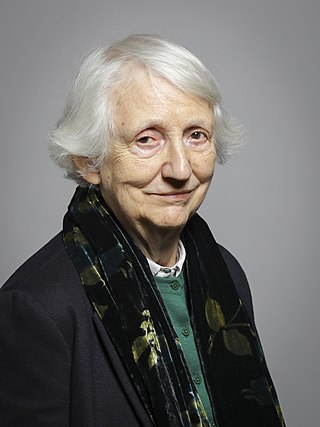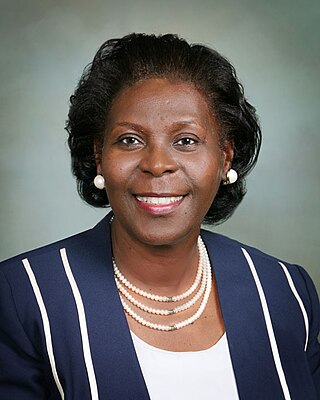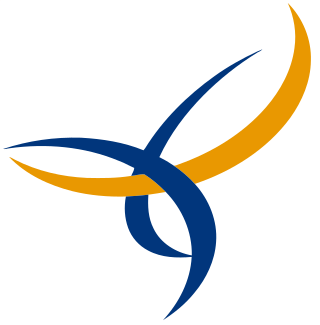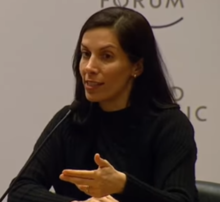
Onora Sylvia O'Neill, Baroness O'Neill of Bengarve, is a British philosopher and a crossbench member of the House of Lords.
In philosophy and neuroscience, neuroethics is the study of both the ethics of neuroscience and the neuroscience of ethics. The ethics of neuroscience concerns the ethical, legal and social impact of neuroscience, including the ways in which neurotechnology can be used to predict or alter human behavior and "the implications of our mechanistic understanding of brain function for society... integrating neuroscientific knowledge with ethical and social thought".

Patricia Ann "Pat" Timmons-Goodson is an American judge and politician who served on the North Carolina Supreme Court from 2006 to 2012. She previously served on the United States Commission on Civil Rights and is a former nominee to be a federal judge for the United States District Court for the Eastern District of North Carolina. Timmons-Goodson ran for Congress in 2020.
Cognitive liberty, or the "right to mental self-determination", is the freedom of an individual to control their own mental processes, cognition, and consciousness. It has been argued to be both an extension of, and the principle underlying, the right to freedom of thought. Though a relatively recently defined concept, many theorists see cognitive liberty as being of increasing importance as technological advances in neuroscience allow for an ever-expanding ability to directly influence consciousness. Cognitive liberty is not a recognized right in any international human rights treaties, but has gained a limited level of recognition in the United States, and is argued to be the principle underlying a number of recognized rights.
Sandra G. Harding is an American philosopher of feminist and postcolonial theory, epistemology, research methodology, and philosophy of science. She directed the UCLA Center for the Study of Women from 1996 to 2000, and co-edited Signs: Journal of Women in Culture and Society from 2000 to 2005. She is currently a Distinguished Professor Emeritus of Education and Gender Studies at UCLA and a Distinguished Affiliate Professor of Philosophy at Michigan State University. In 2013 she was awarded the John Desmond Bernal Prize by the Society for the Social Studies of Science (4S).

The Hastings Center is an independent, nonpartisan bioethics research institute and think tank based in Garrison, New York. It was instrumental in establishing the field of bioethics and is among the most prestigious bioethics and health policy institutes in the world.

Donna L. Dickenson is an American philosopher who specializes in medical ethics. She is Emeritus Professor of Medical Ethics and Humanities at the University of London, fellow of the Ethox and HeLEX Centres at the University of Oxford, and visiting fellow at the Centre for Ethics in Medicine, University of Bristol.

Nikolas Rose is a British sociologist and social theorist. He is Distinguished Honorary Professor at the Research School of Social Sciences, in the College of Arts and Social Sciences at the Australian National University and Honorary Professor at the Institute of Advanced Studies at University College London. From January 2012 to until his retirement in April 2021 he was Professor of Sociology in the Department of Global Health and Social Medicine at King's College London, having joined King's to found this new Department. He was the Co-Founder and Co-Director of King's ESRC Centre for Society and Mental Health. Before moving to King's College London, he was the James Martin White Professor of Sociology at the London School of Economics, director and founder of LSE's BIOS Centre for the Study of Bioscience, Biomedicine, Biotechnology and Society from 2002 to 2011, and Head of the LSE Department of Sociology (2002–2006). He was previously Professor of Sociology at Goldsmiths, University of London, where he was Head of the Department of Sociology, Pro-Warden for Research and Head of the Goldsmiths Centre for Urban and Community Research and Director of a major evaluation of urban regeneration in South East London. He is a Fellow of the British Academy, the Royal Society of Arts and the Academy of Social Sciences, and a Fellow of the Royal Danish Academy of Science and Letters. He holds honorary doctorates from the University of Sussex, England, and Aarhus University, Denmark.
The following outline is provided as an overview of and topical guide to ethics.
Jonathan D. Moreno is an American philosopher and historian who specializes in the intersection of bioethics, culture, science, and national security, and has published seminal works on the history, sociology and politics of biology and medicine. He is an elected member of the National Academy of Medicine.

Anita LaFrance Allen is the Henry R. Silverman Professor of Law and professor of philosophy at the University of Pennsylvania Law School. She was formerly Vice Provost for Faculty from 2013 to 2020.

The National Core for Neuroethics at the University of British Columbia was established in August 2007, with support from the Canadian Institutes of Health Research, the Institute of Mental Health and Addiction, the Canada Foundation for Innovation, the British Columbia Knowledge Development Fund, the Canada Research Chairs program, the UBC Brain Research Centre and the UBC Institute of Mental Health. Co-founded by Judy Illes and Peter Reiner, the Core studies neuroethics, with particular focus on ethics in neurodegenerative disease and regenerative medicine, international and cross-cultural challenges in brain research, neuroimaging and ethics, the neuroethics of enhancement, and personalized medicine.
Judy Illes,, PHD, FRSC, FCAHS, is Professor of Neurology and Distinguished University Scholar in Neuroethics at the University of British Columbia. She is Director of Neuroethics Canada at UBC, and faculty in the Brain Research Centre at UBC and at the Vancouver Coastal Health Research Institute. She also holds affiliate appointments in the School of Population and Public Health and the School of Journalism at UBC, and in the Department of Computer Science and Engineering at the University of Washington in Seattle, WA. USA. She was appointed a member of the Order of Canada in 2017.
The Presidential Commission for the Study of Bioethical Issues was created by Executive Order 13521 on November 24, 2009. The Bioethics Commission advised President Barack Obama on bioethical issues arising from advances in biomedicine and related areas of science and technology. It replaced The President's Council on Bioethics appointed by United States President George W. Bush to advise his administration on bioethics, and the National Bioethics Advisory Commission (1996-2001). No national organization replaced it when its authorization expired; it "held its final meeting at the end of August 2016 and closed its doors."
August Kenneth Pye was the President of Southern Methodist University from 1987 to 1994.
The International Neuroethics Society (INS) is a professional organization that studies the social, legal, ethical, and policy implications of advances in neuroscience. Its mission is to encourage and inspire research and dialogue on the responsible use of advances in brain science. The current INS President is Joseph J. Fins, MD.

Françoise Elvina BaylisFISC is a Canadian bioethicist whose work is at the intersection of applied ethics, health policy, and practice. The focus of her research is on issues of women's health and assisted reproductive technologies, but her research and publication record also extend to such topics as research involving humans, gene editing, novel genetic technologies, public health, the role of bioethics consultants, and neuroethics. Baylis' interest in the impact of bioethics on health and public policy as well as her commitment to citizen engagement]and participatory democracy sees her engage with print, radio, television, and other online publications.

S. Matthew Liao is an American philosopher specializing in bioethics and normative ethics. He is internationally known for his work on topics including children’s rights and human rights, novel reproductive technologies, neuroethics, and the ethics of artificial intelligence. Liao currently holds the Arthur Zitrin Chair of Bioethics, and is the Director of the Center for Bioethics and Affiliated Professor in the Department of Philosophy at New York University. He has previously held appointments at Oxford, Johns Hopkins, Georgetown, and Princeton.

Christine I. Mitchell is an American filmmaker and bioethicist and until her retirement in September 2022, the executive director of the Center for Bioethics at Harvard Medical School (HMS).
Susan Sherwin is a Canadian philosopher. Her pioneering work has shaped feminist theory, ethics and bioethics, and she is considered one of the world's foremost feminist ethicists.










